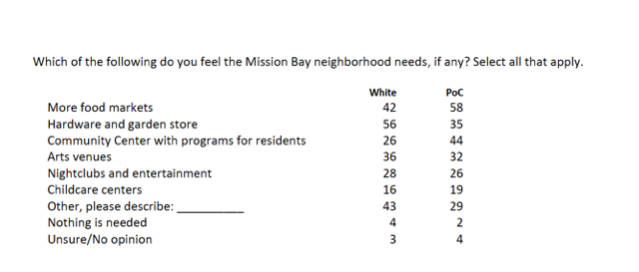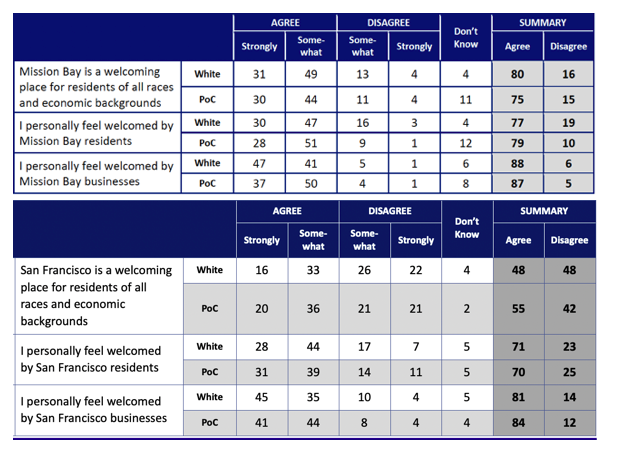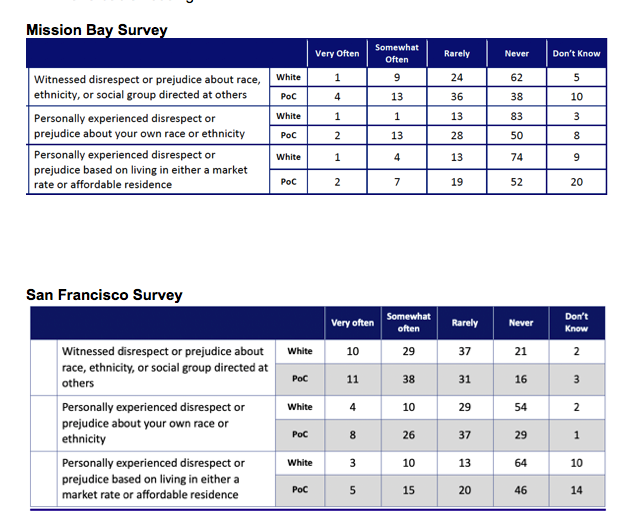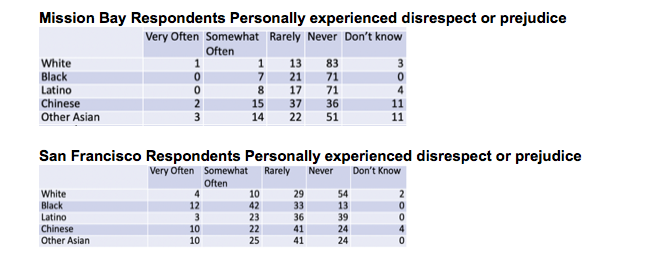To fully understand the social dynamics of Mission Bay from the perspective its residents, it is extraordinarily significant to learn that Mission Bay BIPOC residents feel more welcome and personally experienced less racism there in comparison to the rest of San Francisco.
A segment of TODCO’s Mission Bay resident survey by David Binder Research in May/June of this year presented a series of questions about the social dynamics in the community involving race. Almost half of the respondents self-identified as BIPOC (Black, Indigenous, and People of Color), with 25 percent of those interviewed identifying as Chinese-American. There are several notable demographic differences for BIPOC residents overall compared to their White Mission Bay resident counterparts:
- They are more likely to have children (27 percent compared to 7 percent).
- They are more likely to work in tech (58 percent compared to 33 percent).
- They were somewhat less likely to want to move out of the neighborhood (13 percent compared to 17 percent).
Overall, they are more optimistic about Mission Bay’s being a real neighborhood or on-track to being a real neighborhood. 27percent of BIPOC residents believe Mission Bay is a real neighborhood compared to only 17percent of white respondents.

Residents of color also noted that Mission Bay needed more elements to be a complete neighborhood. They generally believe the neighborhood is in need of more food markets (58 percent versus 42 percent), expressed more interest in a community center with programs for residents (44 percent versus 26 percent), and less interest in a hardware/garden store (35 percent versus 56 percent).

Significantly, 75 percent of BIPOC Mission Bay residents believe their neighborhood is welcoming for all races and economic backgrounds, compared to how only 55percent of BIPOC residents perceive San Francisco as a whole. And 79 percent of BIPOC Mission Bay respondents felt personally welcomed in their neighborhood compared to 70 percent citywide.

This is a nearly 20 percent positive differential in how BIPOC residents perceive their experience as being welcomed where they live in contrast to BIPOC residents being welcomed throughout all San Francisco!
The two surveys conducted by David Binder Research, the Mission Bay survey and city-wide survey, both dug deeper into these interpersonal dynamics with questions to learn if respondents directly witnessed or personally experienced disrespect or prejudice. The difference in response between the two surveys is pronounced:
- 53 percent of Mission Bay BIPOC residents have witnessed disrespect or prejudice there, 43 percent have personally experienced it there, and 28 percent have experienced class bias for living in either Mission Bay’s market rate or affordable housing.
- While 80 percent of BIPOC residents citywide have witnessed disrespect or prejudice in San Francisco, 71 percent have personally experienced it, and 40 percent have experienced class bias for living in either a market rate or affordable housing.

Again, this is an 18 percent disparity in experiencing disrespect or prejudice between Mission Bay BIPOC residents and BIPOC residents citywide. A statistical concern might be that this is an apples to oranges comparison if the demographics of Mission Bay BIPOC respondents was much different than citywide respondents. But actually both surveys had similar proportions of Black and API respondents. The only difference was the citywide poll had a greater percentage of Latinx respondents and fewer white respondents. However, the in-depth detailed data of the Mission Bay and citywide polls both show that all BIPOC racial groups experienced less disrespect and prejudice in Mission Bay compared to the City as a whole.

The reasons why BIPOC respondents citywide had more experiences with disrespect and prejudice compared to Mission Bay BIPOC residents is suggested in the open-ended written responses of the citywide survey.
The open-ended survey asked why there is racial tension. There were frequent comments from citywide respondents about the lack of affordable housing, income inequality, gentrification and displacement, cost of living, discrimination against Asians, lack of empathy, and segregation. These in general reflect the concerns of many about community and economic instability, and the often difficult racial histories of some neighborhoods.
While instead, in 20-year old Mission Bay, resident concerns about affordable housing and gentrification and resulting community instability are not applicable at all, because the entire neighborhood is essentially brand new and decent affordable housing is secure for more than 30 percent of its residents. And likewise, there is no social history good or bad to resolve.
While these are promising societal aspects for Mission Bay’s future, residents there still experience consequential racism and prejudice. The hope must be that all populations one day can respond they never experience disrespect or prejudice due to their race or ethnicity. Mission Bay is on the cusp of creating an inclusive environment for its people. For this positive outcome to be realized, the priorities of BIPOC communities must consistently be incorporated in future Mission Bay community building from now on.
Barbara Lopez is director of state and community regional engagement and public policy at TODCO.






